About Paneer Butter Masala Recipe
This Paneer Butter Masala recipe is a rich and creamy dish of paneer (Indian cottage cheese) in a tomato, butter and cashew sauce that is known here as “makhani gravy.” The acidity of the tomatoes and the sweetness of the cream make for a velvety, nearly addictive sauce.
Also known as “Butter Paneer,” this yummy and popular vegetarian dish is derived from the recipe for Butter Chicken, a.k.a. Chicken Makhani, that I learned to make during my cooking school days. I know, I know, the thought of me cooking with meat sounds insane. It seems nearly a lifetime ago!
With my easy, quick and delicious recipe you can prepare this Restaurant style Paneer Butter Masala at home. In fact, it’s so easy that you can make it on even busy weeknights! This simple dinner takes just 10 minutes of prep work and 30 minutes on the stove.
My delicious Paneer Butter Masala recipe is one of the most popular recipes on the blog. It has been made and loved by hundreds of readers.
Don’t just take my word for it, either. You can read the comments at the end of the post, which has a lot of positive feedback and reviews from our readers and fans.
Ingredients You Need
1. Ripe, red & juicy tomatoes: Tomatoes are a key ingredient here and form the base of the makhani sauce. As such, it is important to choose good, ripe tomatoes that are sweet.
If ripe tomatoes are not in season where you live, I suggest opting for using canned whole tomatoes that you blend instead.
These canned tomatoes are picked at peak ripeness, and for whatever reason, the whole variety is generally much more flavorful than tomato purée.
2. Raw Cashews: Yet another important ingredient for the gravy is cashews. The nuts impart a lovely creaminess and sheen in the dish, and the sweetness of the cashews help to balance the tanginess of the tomatoes.
If you are nut free, please see my recipe for Paneer Makhani, which tastes quite similar but is made with just cream and no cashews.
3. Cream: In addition to using cashew paste, this Butter Paneer recipe calls for cream to help thicken the sauce and add richness.
If you are vegan, you can opt to use coconut cream instead, though you should note that the final flavor of the dish will be impacted a bit. You can also opt to omit the cream for a less rich gravy, too.
4. Butter: The amount of butter that is added is just right in this paneer butter masala recipe. Butter makes the curry luxurious and, well… buttery.
I don’t add a ton of butter here, so you don’t have to feel too guilty about it. Also note that you can go overboard by adding too much butter, so I recommend that you stick to the recipe.
5. Paneer: The quality of your paneer can make or break your dish. What you want are succulent, soft paneer cubes gently coated with a smooth, buttery tomato sauce.
Make sure to use either Homemade Paneer (which I believe is always the best option) or good quality store bought paneer. If you opt to use store bought, be sure to follow the instructions on the package before using.
6. Spices & Herbs: One reason this recipe is so great for weeknights is that the list of herbs and spices isn’t intimidatingly long. For that brilliant orange color, you need to add Kashmiri red chilli powder.
If you don’t have any on hand, you can sub it with cayenne pepper or sweet paprika instead. You will also need garam masala powder. Kasuri methi, which are dried fenugreek leaves, also add good flavor.
Just skip them if you do not have them. For garnish, fresh cilantro (coriander leaves) are added.
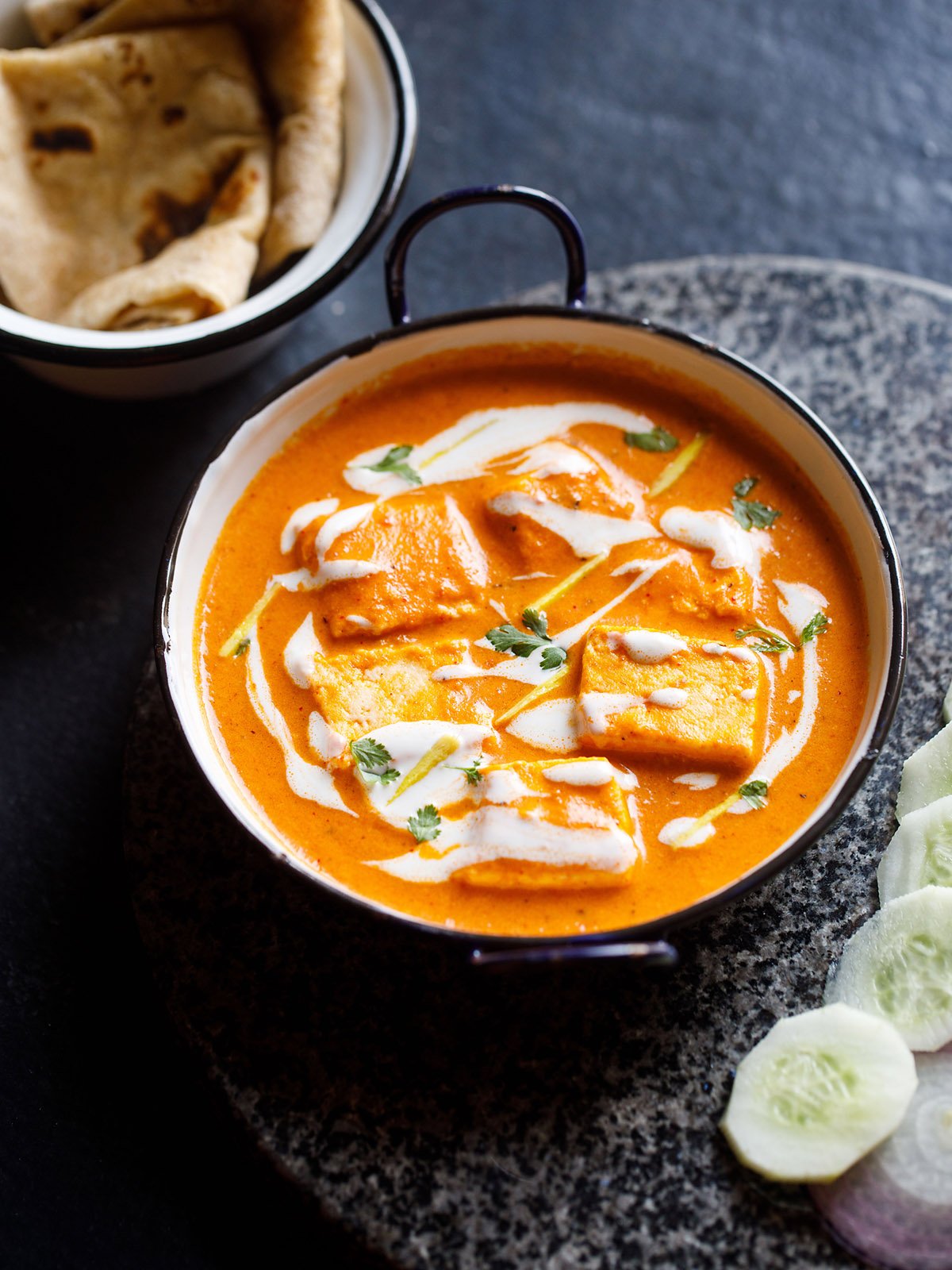
How to Make Paneer Butter Masala
You will have to do some light prep work before you begin making this delicious recipe. It starts with soaking your cashews, making tomato puree and blending soaked cashews.
Preparation
1. Soak 18 to 20 cashews in ⅓ cup hot water for 20 to 30 minutes.
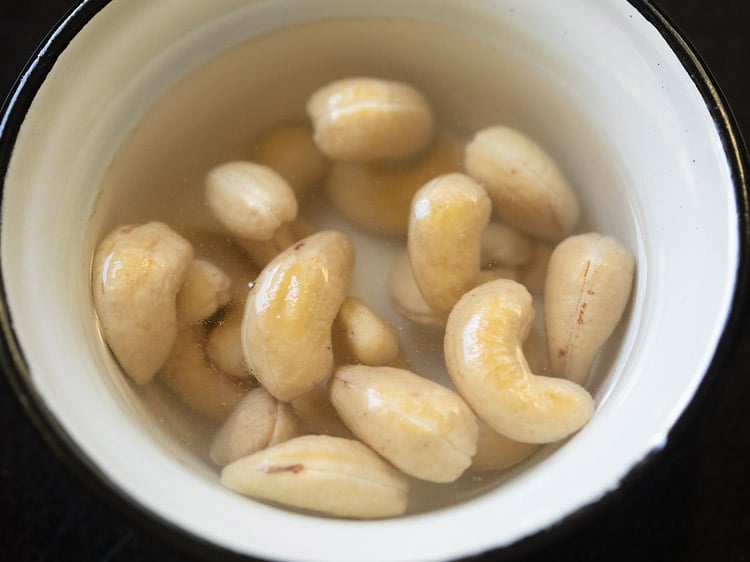
2. While the cashews are soaking, you can prep the other ingredients. It’s time for chopping tomatoes, chopping and preparing the ginger-garlic paste, and slicing paneer into cubes.
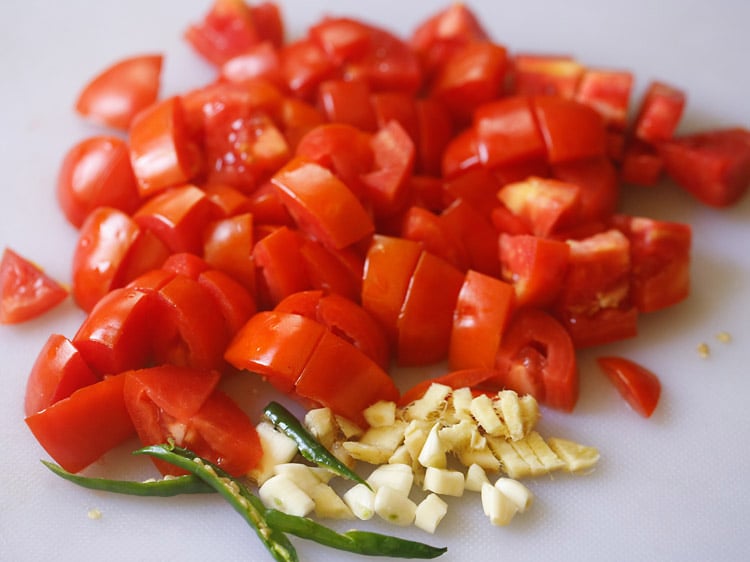
3. To make the ginger garlic paste, crush a 1 inch piece of peeled ginger with 3 to 4 small to medium-sized garlic cloves in a mortar & pestle. Continue crushing until it is a semi-fine or fine paste. Keep aside.
Note: Don’t add any water while crushing ginger & garlic.
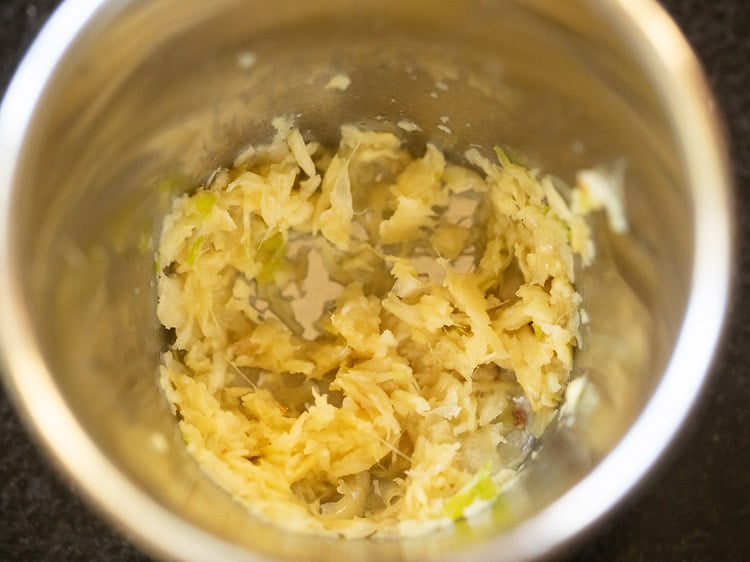
4. After 20 to 30 minutes, drain the water and add the soaked cashews to a blender or mixer-grinder.
Also, add 2 to 3 tablespoons fresh water (or as much as is required to blend to a fine paste).
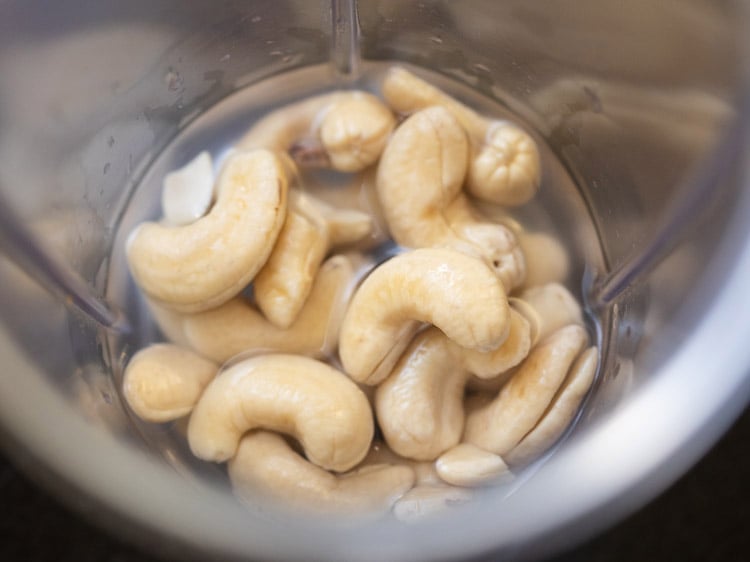
5. Blend to a smooth paste without any tiny bits or chunks of cashews. Remove the cashew paste from the blender and set it aside.
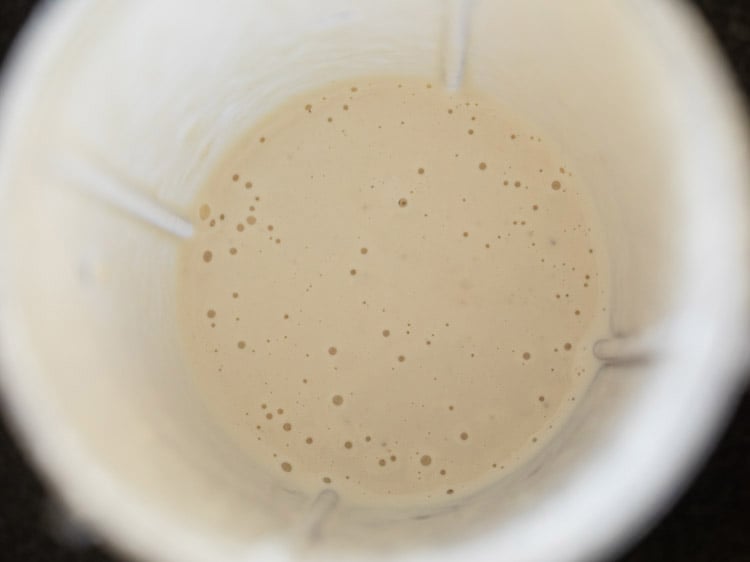
6. In the same blender, add 2 cups of diced or roughly chopped tomatoes.
Note: There’s no need to blanch the tomatoes or to wash the blender pitcher before blending.
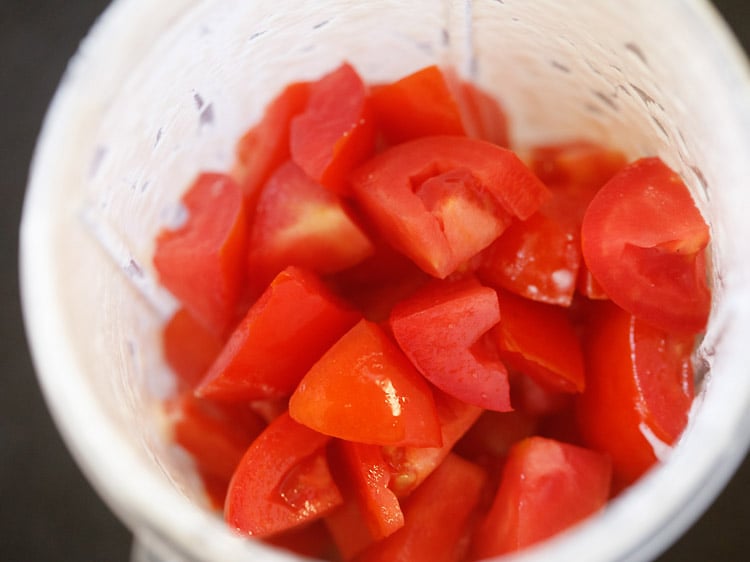
7. Blend to a smooth tomato puree. Set aside.
Note: Don’t add any water while blending the tomatoes.
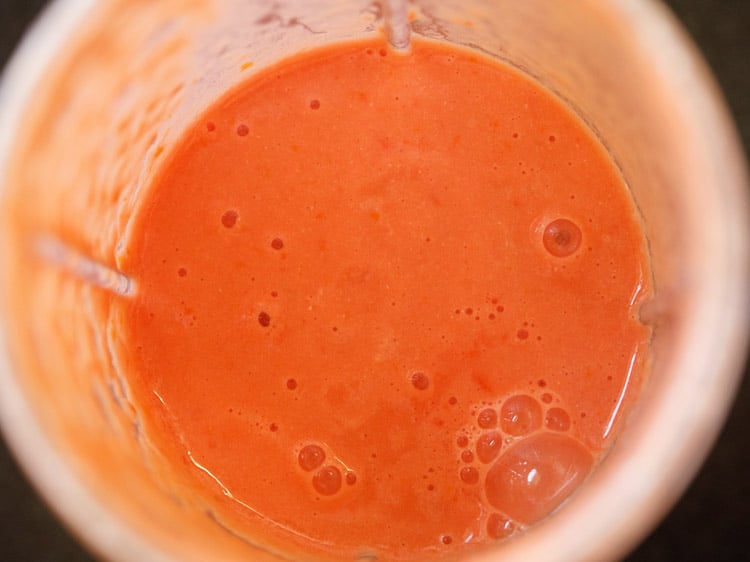
Make Tomato Gravy
8. Heat a thick bottomed pan or a heavy pan. Keep the heat to a low or medium-low. Add 2 tablespoons (or 3 to 4 tablespoons for a richer version) butter in a pan. Either salted or unsalted butter can be used.
Tip: Alternatively, you can add 1 tablespoon oil + 1-2 tablespoons of butter to the pan. Adding oil prevents the butter from browning too quickly.
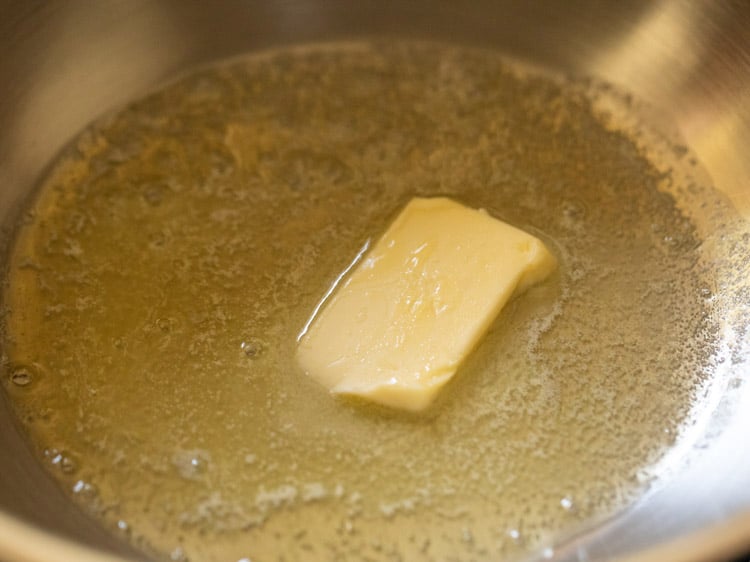
9. Keep the the heat to a low. Add 1 medium-sized tej patta and fry for 2 to 3 seconds, or until fragrant.
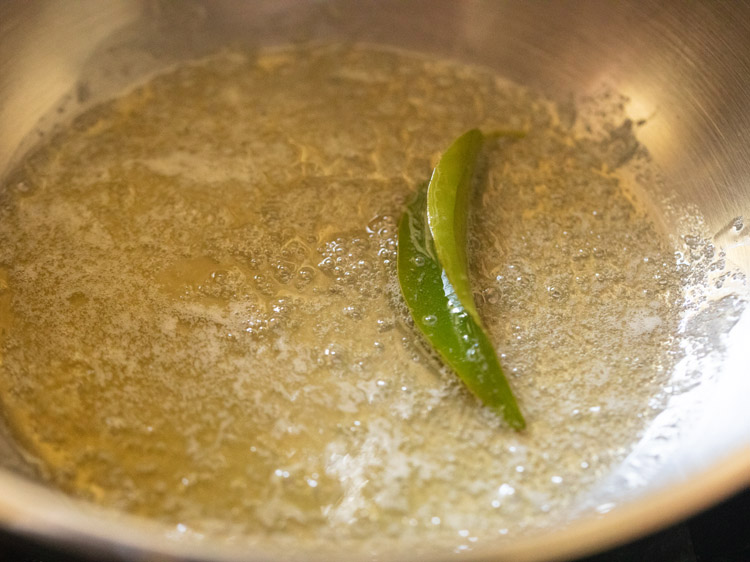
10. Add the prepared crushed ginger-garlic or 1 teaspoon ready-made ginger-garlic paste.
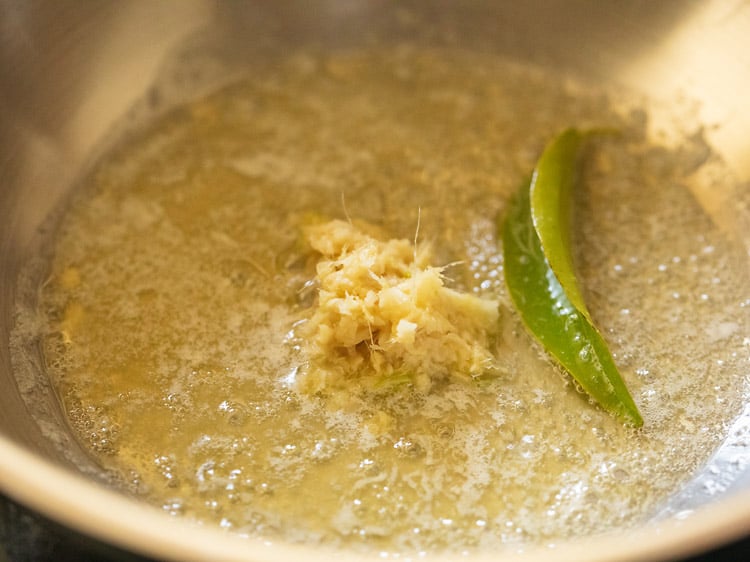
11. Sauté until the raw aroma of the ginger-garlic disappears, about 10 to 12 seconds.
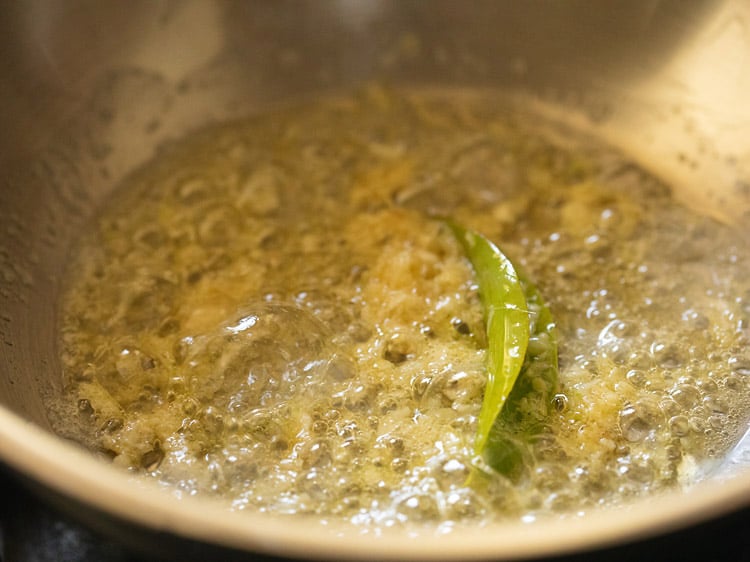
12. Pour in the prepared tomato purée.
Note: Be careful while adding the purée as it may splutter.
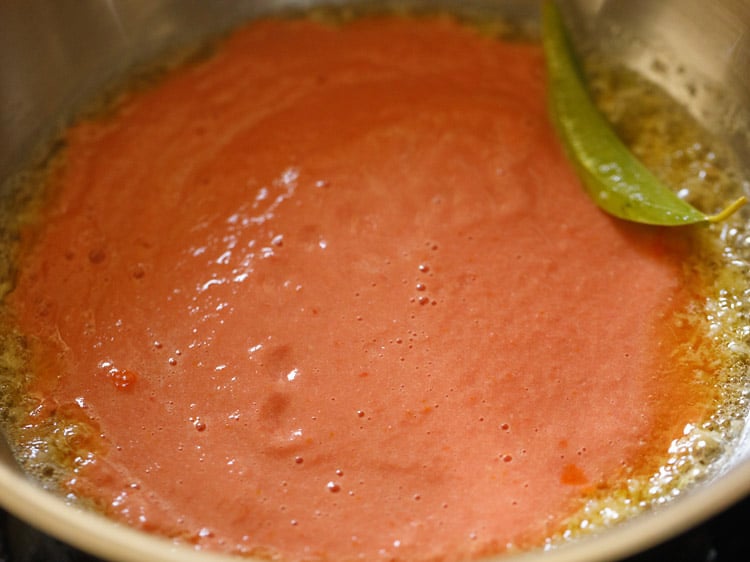
13. Mix it very well with the butter.
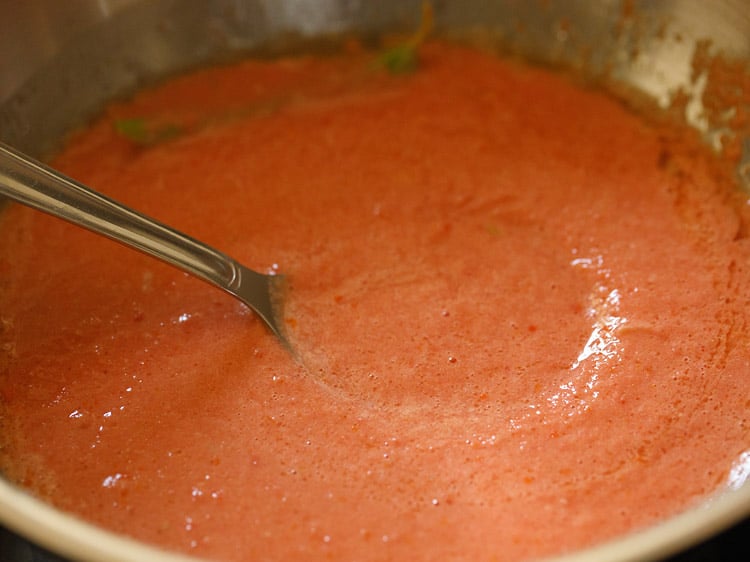
14. Begin to cook the tomato purée on a low to medium-low heat. Stir at intervals.
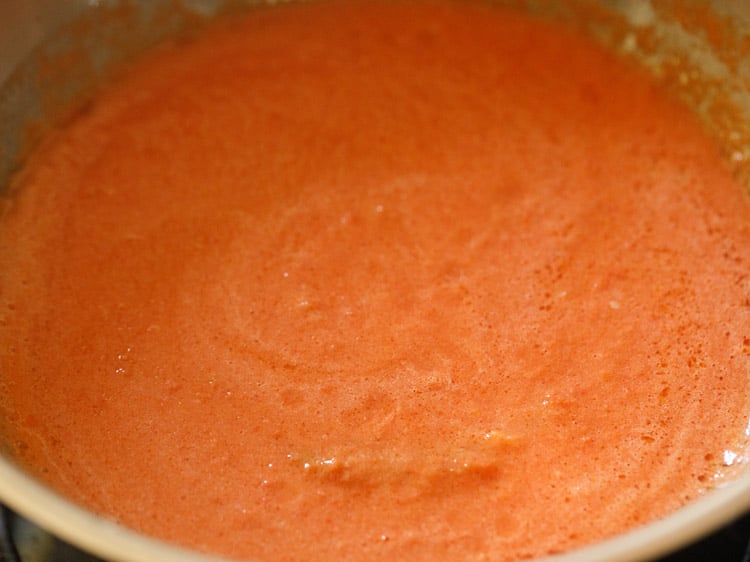
15. The tomato purée mixture will start simmering.
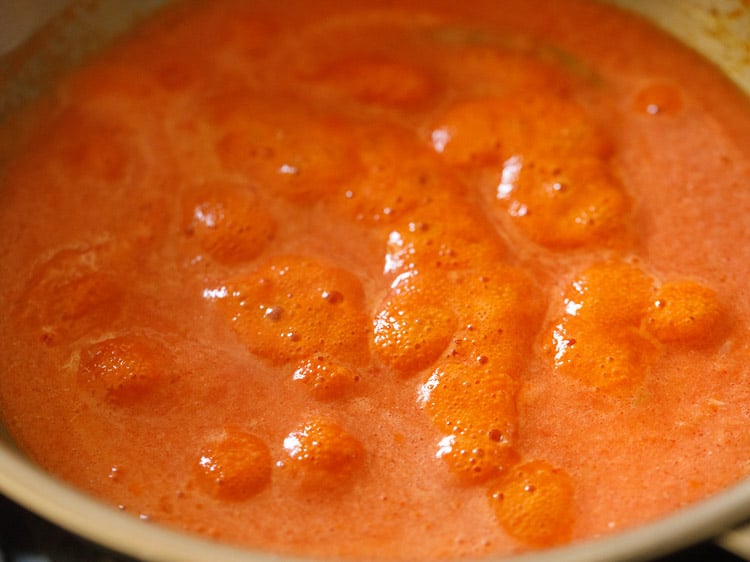
16. If the tomato purée splutters too much while cooking, then cover the pan partly with a lid or cover fully with a splatter guard (channi lid).
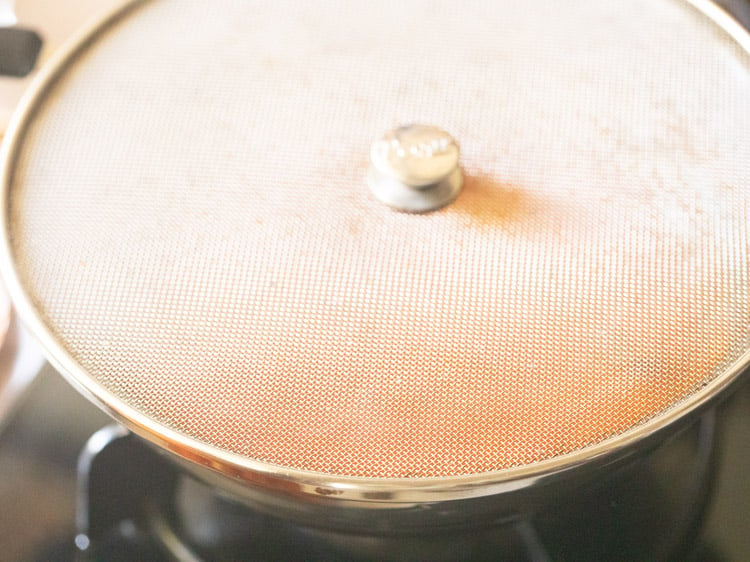
17. Continue stirring occasionally.
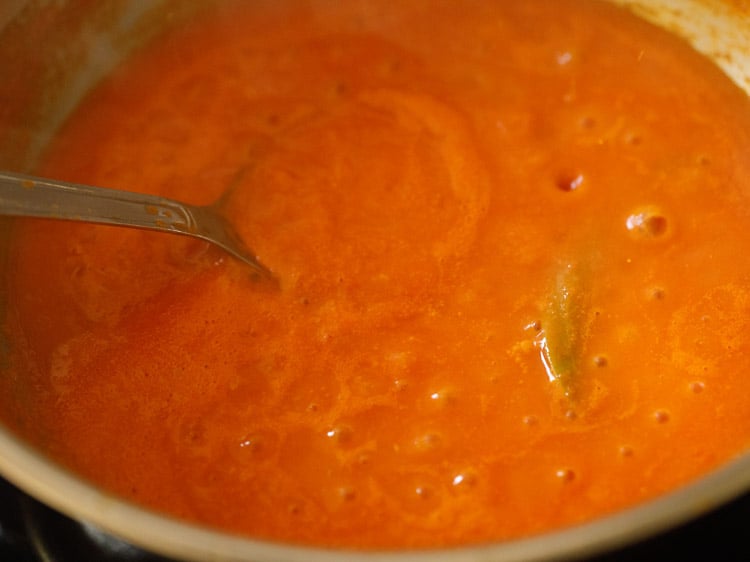
18. Simmer the purée for 5 to 6 minutes.
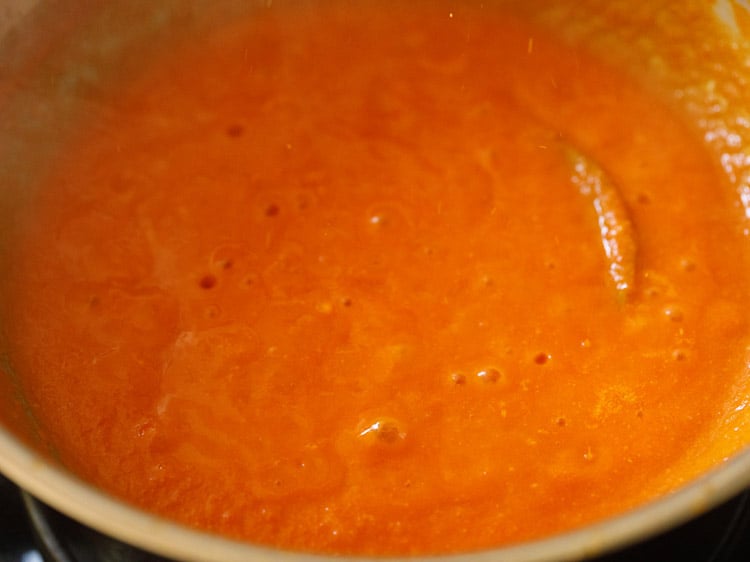
19. Add 1 teaspoon Kashmiri red chili powder or deghi mirch.
You can also opt to add just ½ teaspoon Kashmiri red chili powder, or ¼ – ½ teaspoon of cayenne, paprika or any other variety of red chilli powder that you prefer.
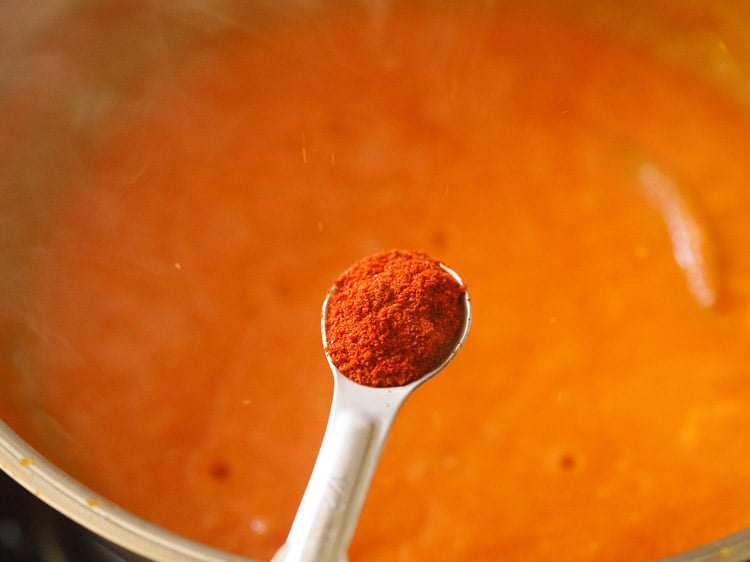
20. Mix well and continue to stir and sauté the tomato purée.
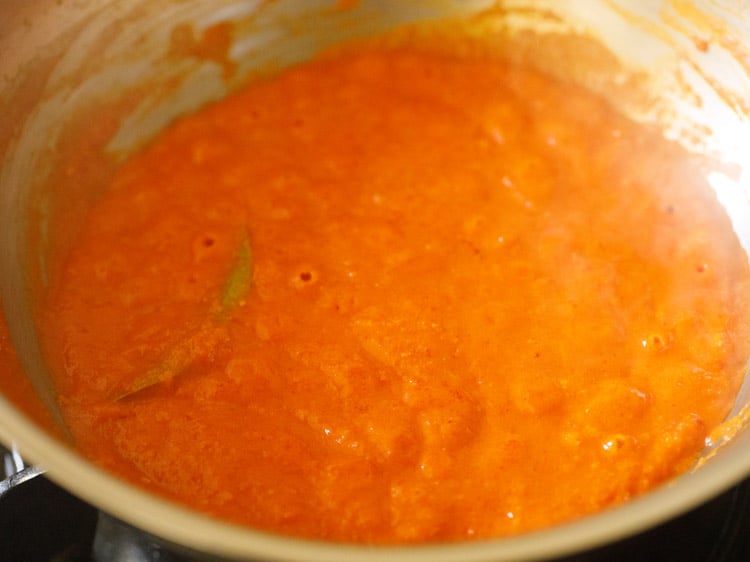
21. Sauté till the butter starts leaving the sides of the pan and the entire tomato purée mixture comes together as more of a thick paste.
Note: This entire cooking/sautéing process takes about 14 to 17 minutes on a low to medium-low heat. Time will vary depending on the thickness of the pan, size, the intensity of flame etc.
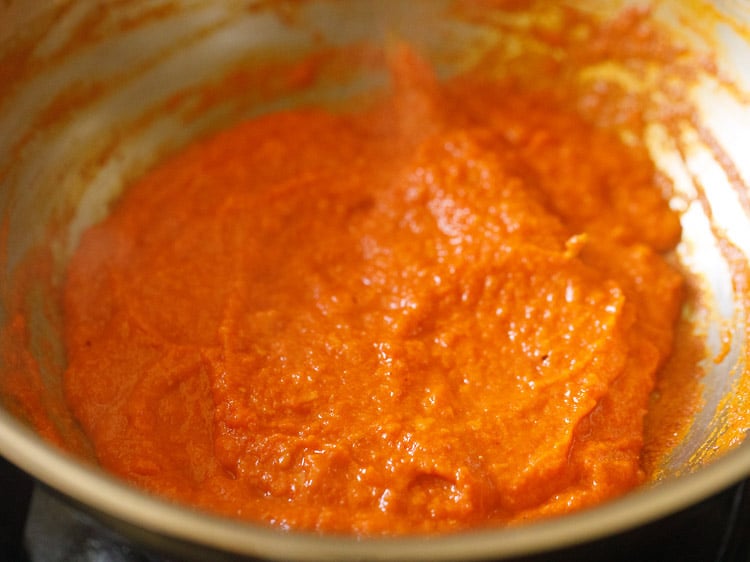
Add Cashew Paste
22. Now add the prepared cashew paste.
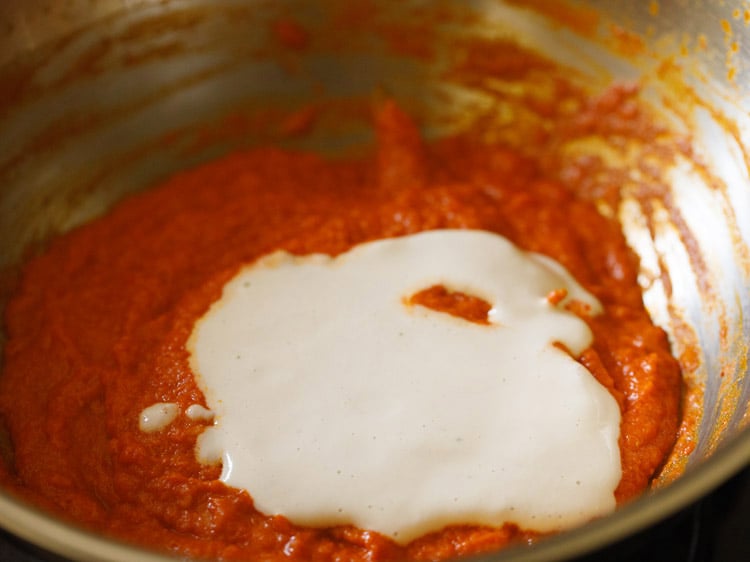
23. Mix the cashew paste very well with the cooked tomato puree and continue to stir and sauté on a low to medium-low heat.
After adding cashew paste, be sure to continuously stir the gravy.
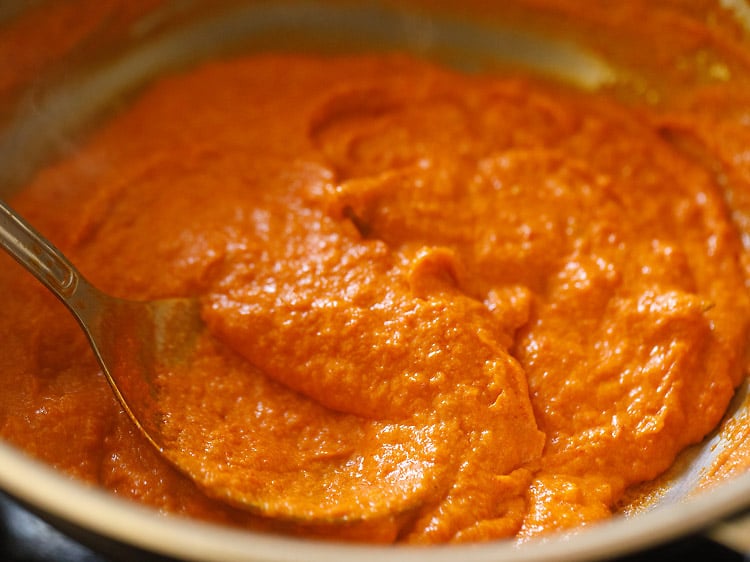
24. Sauté until the cashew paste is cooked and the oil begins to leave the sides of the masala. The cashew will cook quickly, just around 3 to 4 minutes on a low heat. And don’t forget to keep on stirring non-stop!
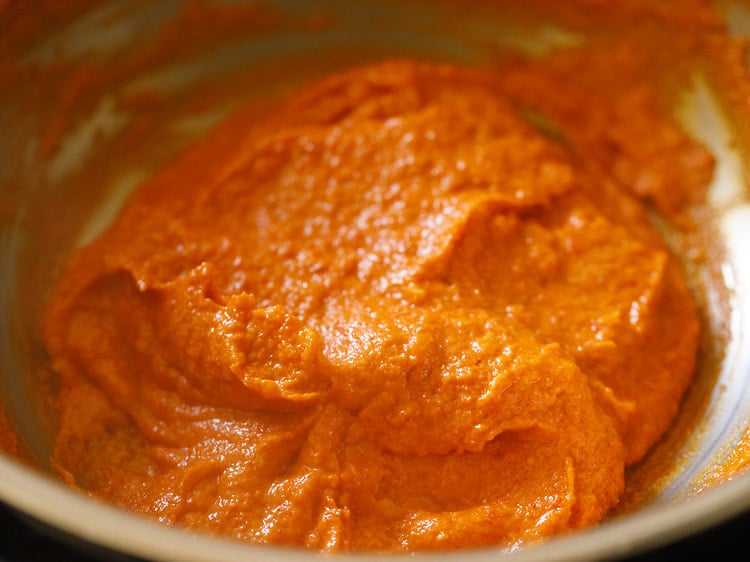
25. Next add 1.5 cups water.
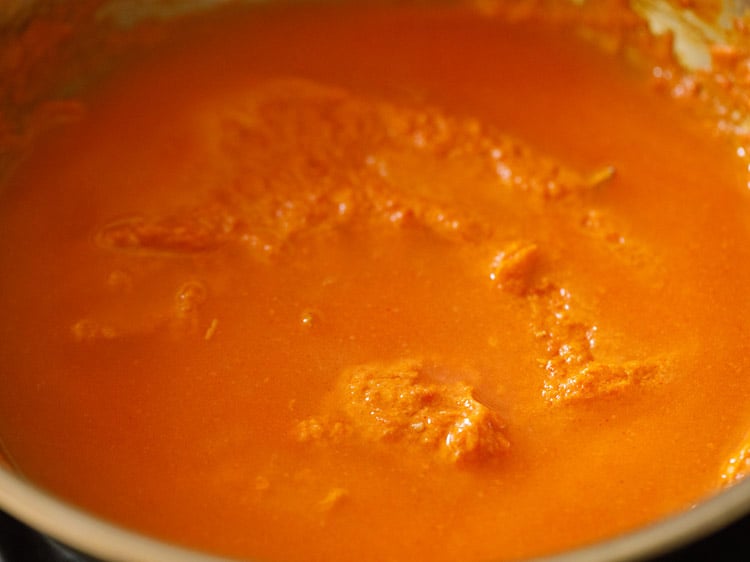
Assemble Paneer Butter Masala
26. Mix the water very well with the tomato-cashew masala. If there are lumps, then break them with a spoon or use a wired whisk for mixing.
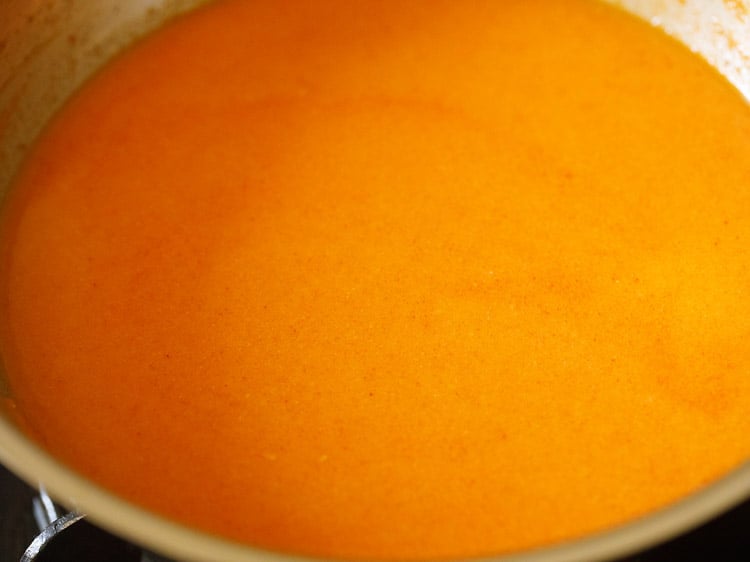
27. Let the curry simmer and come to a boil on a low to medium-low heat. Stir occasionally.
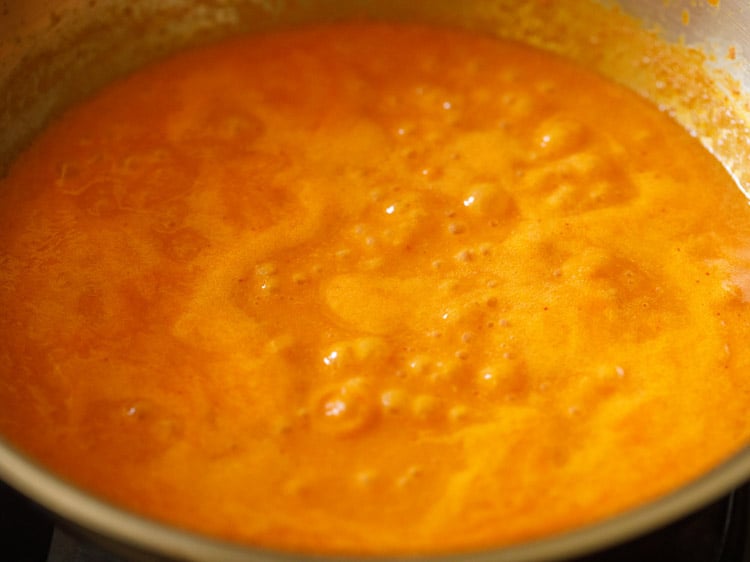
28. After 2 to 3 mins, add ginger julienne (about 1-inch ginger – cut in thin, matchstick-like strips). Reserve a few for garnishing. The curry will begin to thicken.
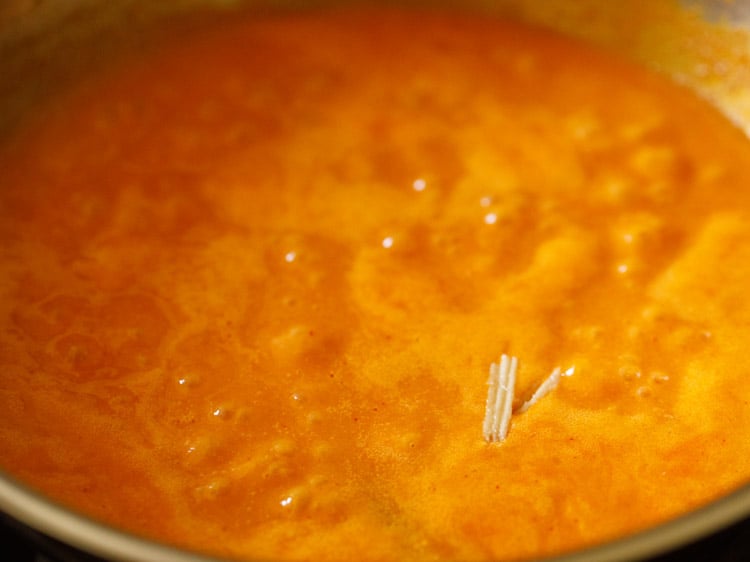
29. After 3 to 4 minutes, add 1 or 2 slit green chiles.
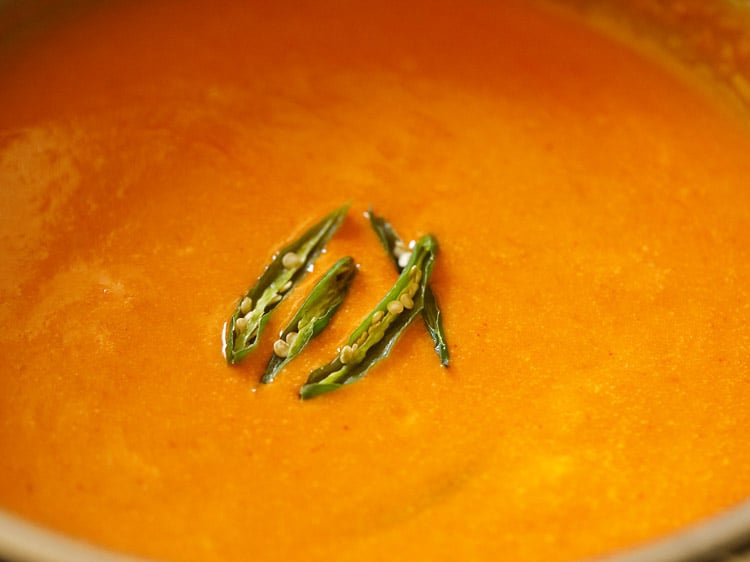
30. Also add salt to taste and, if necessary, ¼ to 1 teaspoon sugar depending on the sourness of the tomatoes.
Tip: If you add cream, then you will need to add less sugar. You can also opt to omit sugar entirely if you prefer.
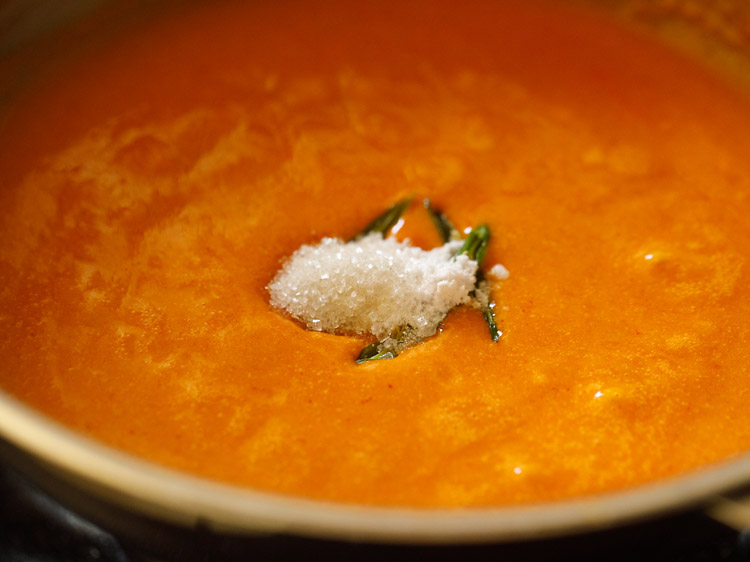
31. Mix very well and simmer for a minute.
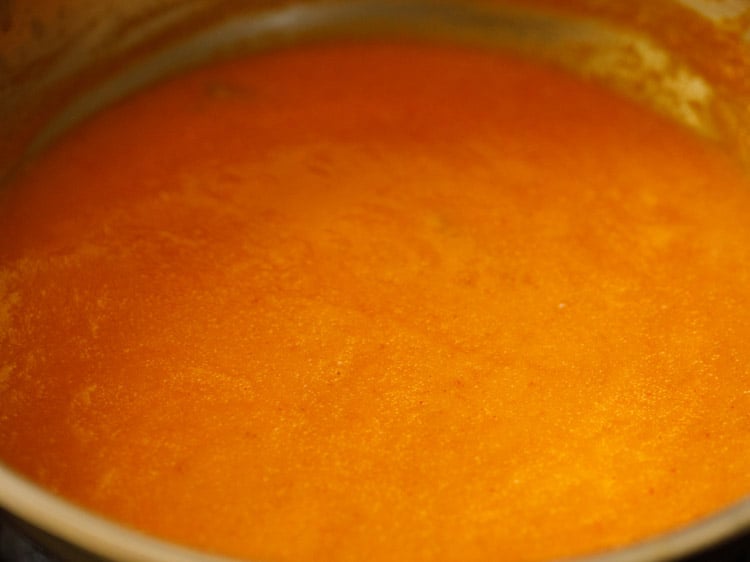
32. After the gravy thickens to your desired consistency, then add the paneer cubes (200 or 250 grams).
Tip: Keep in mind the consistency you want before you add paneer, as you will be cooking the paneer for just a few seconds, until it is warmed through. You can also fry the paneer and then add it once the gravy is to your liking.
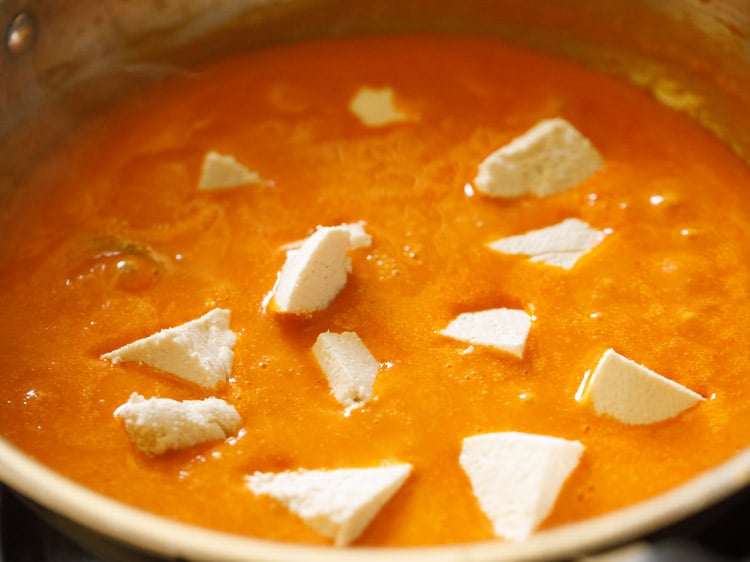
33. Stir and mix the paneer cubes gently in the gravy. You can switch off the heat at this point.
Tip: If your paneer still tastes raw at this point, leave the heat on low until after you add the cream in step 35.
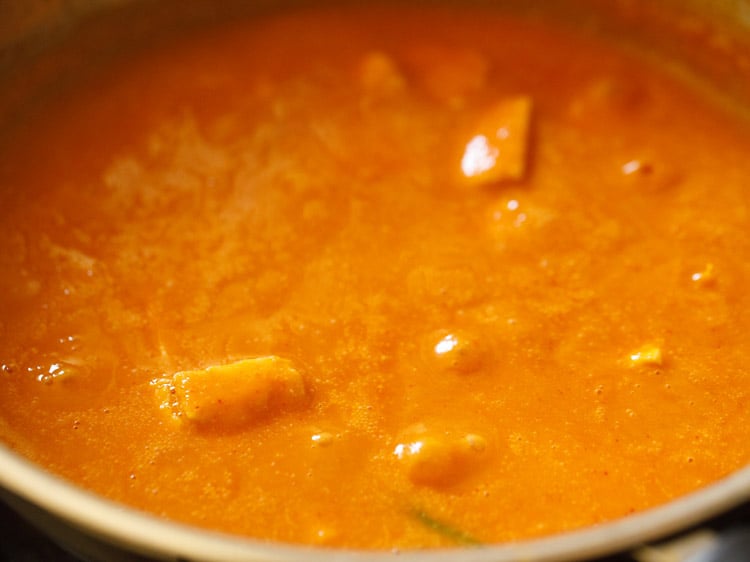
34. Now quickly add 1 teaspoon crushed dry fenugreek leaves (kasuri methi leaves) and 1 teaspoon garam masala to the gravy.
Note: The addition of crushed dry fenugreek leaves gives a restaurant flavor to this curry, but it is optional and can be skipped.
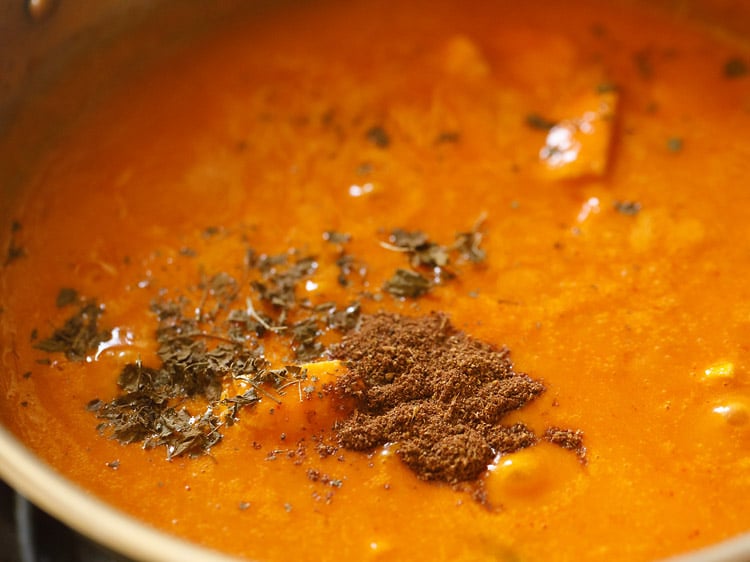
35. Next add 2 to 3 tablespoons of low-fat or light cream or 1 to 2 tablespoons of heavy whipping cream.
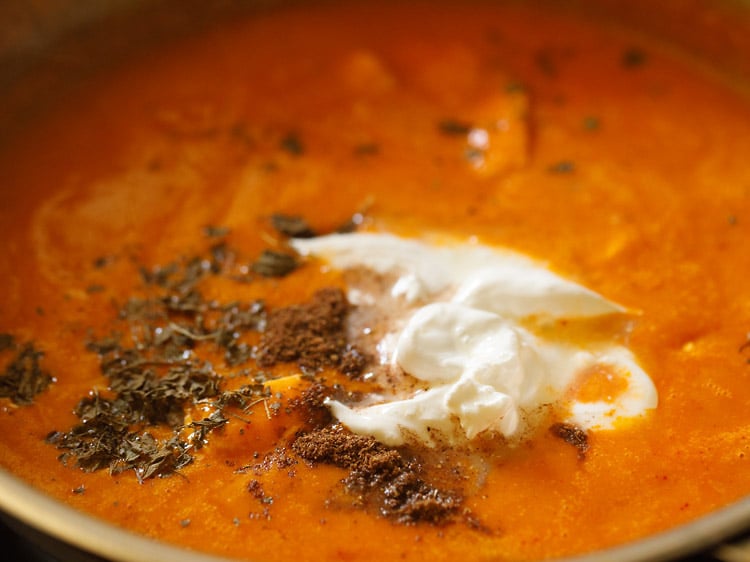
36. Stir gently but well. If you haven’t yet, switch off the heat.
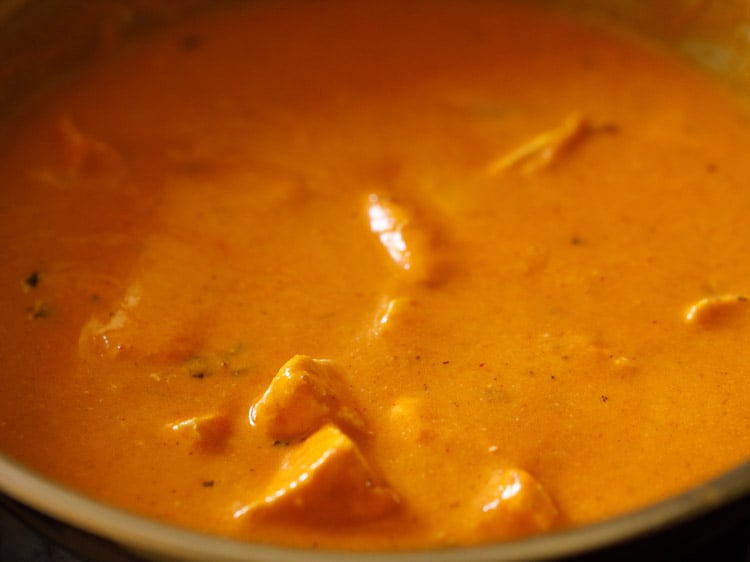
37. Serve Paneer Butter Masala hot garnished with 1 to 2 tablespoons of chopped coriander leaves (cilantro) and the remaining ginger julienne. You can also drizzle some cream or dot with butter while serving. Enjoy!
What to eat with Paneer Butter Masala
-
- Eat with the staple Indian bread roti: Paneer butter masala gravy has a slightly sweet taste and very mildly spiced. Thus making it an excellent gravy to go with roti or chapati.
- With other Indian breads: Another great combination for this dish is naan bread or tandoori roti or paratha or roomali roti or Malabar paratha.
- With rice: It also goes well with steamed basmati rice or jeera rice (cumin rice).
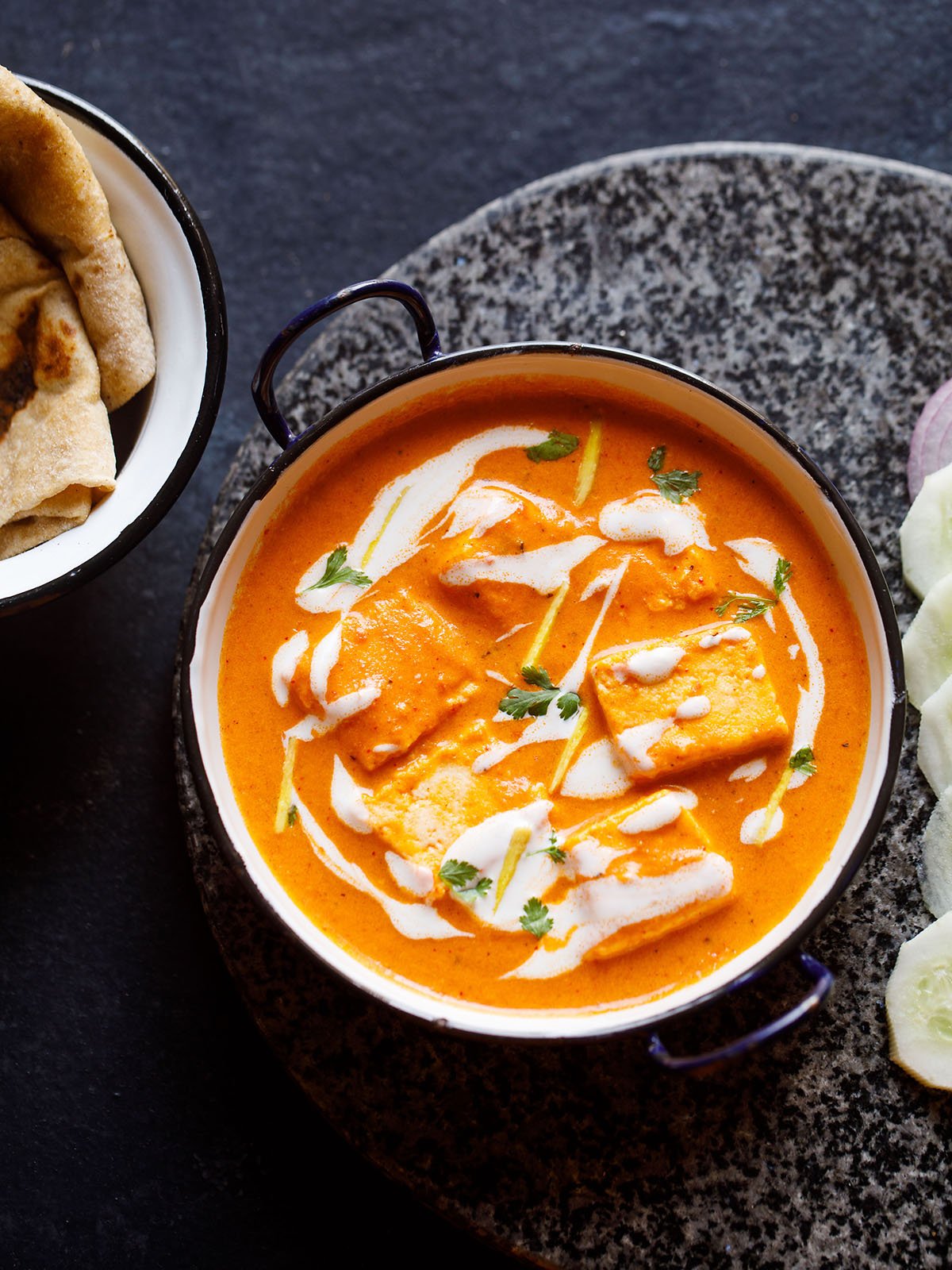
Ingredient Notes and Swaps
-
- Tomatoes: Since tomatoes are the key ingredient, make sure to use ripe, red and firm tomatoes with a slightly sweet taste. If ripe tomatoes aren’t in season, opt for canned instead.
- Paneer (Indian cottage cheese): Always use homemade Paneer if possible, or substitute a good quality, store-bought, fresh paneer. Honestly, it is best to make paneer at home and does not take much time.
- Butter: Use good quality butter. You can use either unsalted or salted, yellow or white butter so long as it is fresh and of good quality.
- Replacement for cashews: If you don’t have cashews, then the best alternative is almonds. Soak the almonds in hot water for 30 minutes, then peel them and blend to a fine consistency with little water. You can also go nut-free and make my Paneer Makhani recipe instead.
- Color: To get the bright orangish-red color that we associate with makhani gravy, it is best to use Kashmiri red chili powder or deghi mirch as your chili powder. Using deep red colored tomatoes also contributes to a lovely orange color in the gravy. I do not recommend using artificial food colors.
Easy Swaps For a Vegan Version
If you are a vegan, don’t worry! You can easily substitute the dairy ingredients with vegan alternatives and still get a delicious dish.
- Tofu: To make a vegan recipe, replace tofu, seitan, tempeh with paneer.
- Vegan Butter or Oil: Add a neutral-tasting oil or vegan butter, and feel free to skip cream altogether.
- Coconut Cream: You can also opt to use coconut cream, but please note that the flavors of coconut will be felt in the final dish if you do.
Expert Tips
-
- Tomato Purée: Be sure that your tomatoes are puréed very well. If you want, you can also strain the tomato purée.
-
- Cooking Tomato Purée: The tomato purée has to be cooked really well. For a visual cue that you have cooked it well enough, the butter should leave sides of the sautéed tomato puree. If the tomato puree is not sautéed well, the raw flavor of tomatoes will be felt in the dish.
- Cashew Paste: To blend cashews to a fine consistency, you should soak them in hot water for 30 minutes. Also, be sure to use raw cashews rather than roasted.
- Taste and Flavor: If the gravy tastes tangy or sour, then balance it out with a bit of sugar (up to 1 teaspoon) or cream. Also, note that if you add cream then you will likely have to add less sugar in the gravy.
- Frying Paneer: You can fry the paneer cubes if you want and then add in the prepared gravy or sauce.
FAQs
Onions are not traditional in makhani gravy and will change the taste of the final dish. But if you still want to add them, just add about ¼ to ⅓ cup finely chopped onions.
You can also add ½ cup onion paste. Add paste after adding tej patta and then sauté the onion paste till light golden.
In Indian recipes where cashews are ground to a paste, raw cashews are always used.
Yes, you can use canned tomato purée, but add up to a teaspoon of sugar in the gravy if the purée is too tangy.
Note: If you are using canned products, I suggest opting for canned whole tomatoes that you purée yourself for the best flavor.
Yes, you can blanch tomatoes before puréeing them, but it is not necessary. If you prefer, you can also opt to strain the tomato purée.
Yes this will reduce the cooking time, but the taste will be same.
In the recipe, use tomatoes which are not very tangy or sour. The tomatoes should be ripe but firm. They should be red in color and not yellow or white.
Roma tomatoes are a good choice. If you live in India, use the large salad tomatoes or larger sized tomatoes and not the small Indian desi variety of tomatoes.
Just skip adding it.
You can add milk powder, but you have to be careful as it makes the dish excessively sweet. I would suggest to add ½ tablespoon initially and do a taste check.
If gravy is not creamy or sweet enough, then add an extra ¼ to ½ tablespoon, but avoid adding more than a total of 1 tablespoon. Do not add milk, as it may curdle from the acidity of tomatoes.
Kasuri methi are dried fenugreek leaves. They are highly aromatic and give a subtle aroma in any dish. You can skip them or sub with a light pinch of ground fenugreek seed powder.
Try adding some more cream and a bit more sugar. This will balance the sourness in the gravy.
Honey becomes toxic when heated, so better to avoid it. Or you can add honey, when the paneer butter masala is warm. Don’t add when hot.
You can use ghee (clarified butter) or neutral tasting oil.


